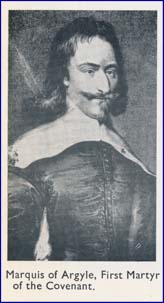Lilias Dunbar was born in 1657 to parents of high society in Scotland. Yet such extraordinary circumstances did not guarantee a long life. Early in her young life, both parents died, leaving her an orphan. Reared by a cousin, she eventually was taken into the family of a pious woman by the name of Lady Duffus, who reared this adopted daughter not just in manners, but also in the things of the Lord. When Lilias was seventeen years of age, a bout with small pox brought her dangerously ill. The sickness led her to promise God that if He healed her, she would strive to be His servant. Made well, she responded to her promise to be the Lord’s servant by seeking to establish her self-righteousness. It was only when her adopted mother passed away in 1677, that she became a genuine believer in the Lord Jesus.
Listen to her profession of faith as found in her diary for May 1, 1677. She writes: “The Lord, who is the Almighty, by his power, made my soul to close with the Lord Jesus, wholly on the terms that the gospel holdeth forth; and the Lord himself gave me faith to believe in Jesus Christ, that he was my Savior, which I could never attain before that time on good grounds. On that blessed morning to me, I got the Rock of ages to be my support, and I got Christ Jesus to be to me the end of the law for righteousness, to comfort me inwardly, under my disconsolate condition outwardly; for it was but fifteen days after the death of my Lady Duffus, who was in place of my parents and all my relations to me. Now I cannot pass by without observing the wisdom and goodness of God to me, in choosing that day and time for my deliverance out of the hands of all mine enemies, that I might serve him without fear. It was the time wherein I was more desolate. I was deprived of my parents by death, and had not the expectation of other means to supply my wants. It was then I was deprived of the only person in the world who took care of me, when it pleased the wise Lord by death to put a separation betwixt my Lady Duffus and me, who died April 16, 1677. Then it was that the gracious God, who delights in showing mercy, did enlarge my heart and make me to take hold of him who is the pearl of great price, in whom all fullness dwells.”
What is interesting to this author about this profession of faith is the custom in those days for new-born Christians to have their religious experiences tested, by communicating their profession of faith with godly minister. In Lilias Dunbar’s case, she went to a minister who was then in prison due to his field preaching, under whom this young convert had heard him preach to her. She brought all that the Lord had done for her soul, which her pastor confirmed the Spirit’s work in her.
At age 22, she married Alexander Campbell. Eventually they would have a dozen children, but not without difficulties in the way. She was charged by the authorities with not attending the parish church where the prelacy pastors led the worship. They brought charges that she instead was attending the outdoor worship of banished Presbyterian pastors meeting in the pastures of the land. She pleaded guilty to the charges and was sentenced to be banished from the kingdom of Scotland. Such punishment was never carried out however.
Words to Live By: What a worthwhile practice our historical character had in seeking to test her religious conversion before a godly minister. Such a practice today would remove the “easy-believism” experiences which are too often found today in the visible church. Second Corinthians 13;5 is clear: “Test yourselves to see if you are in the faith; examine yourselves! Or do you not recognize this about yourselves, that Jesus Christ is in you — unless indeed you fail the test?” (NAS)

